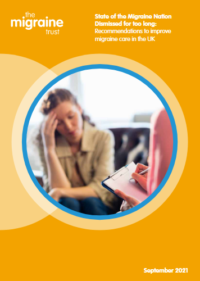New report highlights broken UK migraine healthcare system
Impacting mental health, relationships, and ability to work
A new report that we have published reveals the legacy of pain and damaged lives caused by the UK’s broken migraine healthcare system. From being dismissed as ‘just having a headache’, waiting years to be diagnosed, to lack of access to specialist care and new treatment, the report launched for Migraine Awareness Week (5-11 September) exposes a broken healthcare system which migraine patients struggle to navigate.
This is leading to the worsening of people’s migraine, limiting their ability to carry out their lives with a huge impact on personal relationships, work and mental health. We are calling for an urgent review of migraine healthcare.
The key problems in migraine healthcare that we found

The report, Dismissed for too long, found a wide range of issues with migraine healthcare including:
- Slow or no diagnosis: People with migraine are often only diagnosed several years after starting to have migraine attacks. Our research showed that over half of people who say they have migraine haven’t been officially diagnosed with it by a doctor. Of those who have been officially diagnosed, almost a quarter had been experiencing migraine attacks for over two years before they were diagnosed.
- Lack of access to specialist care: Most migraine patients never see a headache specialist, including those with chronic migraine who are referred to neurologists who may not have an expertise in migraine. We submitted Freedom of Information requests to all Hospital Trusts in England and Health Boards in Northern Ireland, Scotland and Wales to find out what access migraine patients have to specialist care. Only three Health Boards in Northern Ireland (out of five), three Local Health Boards in Wales (out of seven), seven Health Boards in Scotland (out of 14), and 13 Trusts in England (out of 128 contacted), replied and said they had a specialist headache clinic.
Lack of access to new drugs underscores cracks in migraine healthcare
The problems in migraine healthcare have intensified over the last year as many people who are eligible for the new (and first ever drugs developed to prevent migraine) calcitonin gene-related peptide (CGRP) antibody migraine medication have struggled to access it, despite it being approved for use on the NHS.
- Through Freedom of Information requests we found there was a postcode lottery with accessing these drugs where only one Health Board in Northern Ireland (out of five), two Local Health Boards in Wales (out of seven), seven Health Boards in Scotland (out of 14), and 15 Trusts in England (out of 128 contacted), replied and stated that eligible patients could access CGRP treatment.
Significant impact on quality of life
Our research showed that migraine has a very negative impact on the lives of people affected by it, including:
- almost a third (32%) said it negatively affected their mental health
- almost a third (32%) said it negatively affected their overall health
- three in ten (30%) said it negatively affected their working life
- a quarter said it negatively affected their (25%) family life
- over a quarter said it negatively affected their (27%) social life
Our recommendations on how problems can be addressed
We have set out a range of proposals to be considered in order to address these issues which include:
- Everyone attending primary care for head pain should be assessed for migraine, with the outcome of the assessment recorded as a positive or negative diagnosis of migraine.
- Support GPs to make an accurate and rapid diagnosis by making migraine treatment and care a core part of junior doctor and GP training.
- Everyone diagnosed with migraine should receive an individualised care plan, developed closely with them. Regardless of whether medication is prescribed, the individual should have their care plan regularly reviewed at an interval decided with their doctor.
- Integrated Care Systems in England and health boards in Scotland, Wales and Northern Ireland should review their migraine needs (e.g. numbers of people living with migraine who are diagnosed and not yet diagnosed) and plan services to meet these needs. This should include ensuring GPs undertake up-to-date training in migraine management, as well as adequate access to secondary and tertiary specialists.
- Every Integrated Care Systems in England and every local health body in Scotland, Wales and Northern Ireland should appoint a migraine/headache lead to champion migraine care, share guidelines among colleagues, and lead needs assessments, service development and health care professional education across the area.
- Each nation’s department of health should support the recruitment of additional headache specialists and consultant neurologists to bring the UK in line with other European countries.
- Public awareness campaigns should be developed in each of the four nations to improve understanding of the range of migraine symptoms, as well as to reduce the stigma associated with migraine.
“Taking action now to improve migraine care will have far-reaching benefits, not only for the quality of life for the millions of people who experience migraine but also in reducing workdays lost to illness and lessening pressures on A&E departments. We know we could save many more of the 43 million workdays that are lost due to migraine illness in the UK each year and avoid most of the 16,500 emergency admissions for headaches and migraine attacks if we give people better care. Change is urgently needed for the sake of the ten million people in the UK living with migraine.”


